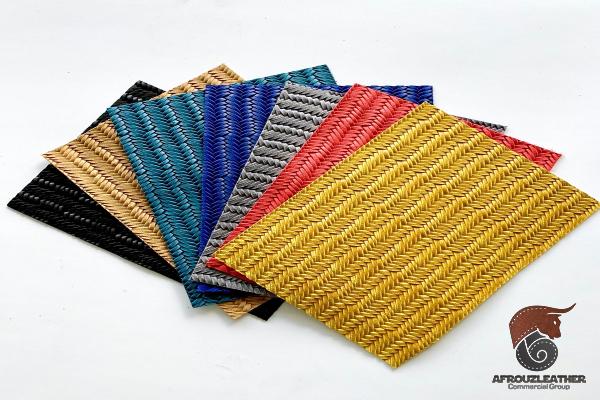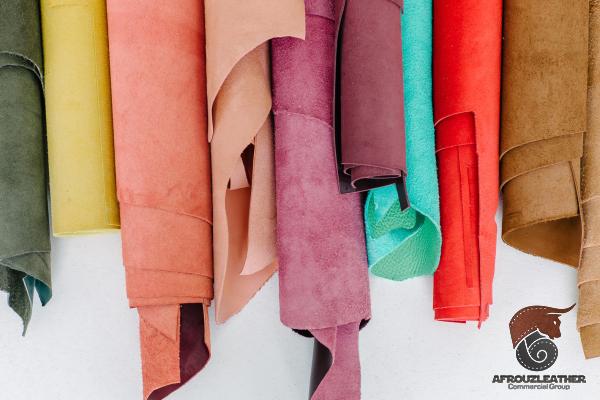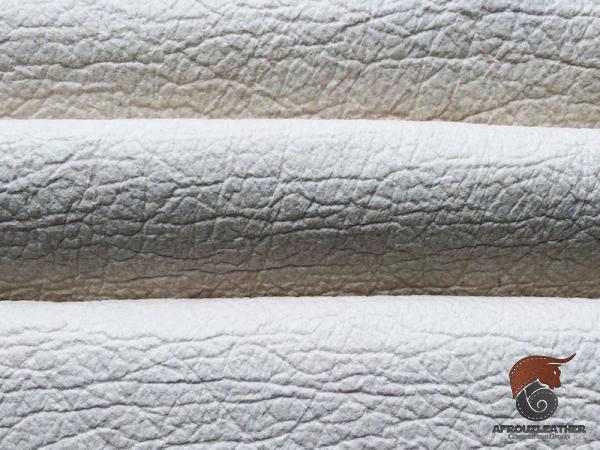Genuine leather is a highly sought-after material known for its durability, versatility, and timeless appeal. As an essential component in various industries, including fashion, furniture, automotive, and accessories, genuine leather manufacturers play a crucial role in meeting the global demand for high-quality leather goods. In this article, we will provide a comprehensive overview of genuine leather material manufacturers, exploring their role in the industry, the manufacturing process, key players, and emerging trends. Role of Genuine Leather Material Manufacturers: Genuine leather manufacturers are responsible for transforming raw animal hides into usable leather materials. Their operations involve ensuring the quality, durability, and consistency of the leather produced. Manufacturers play a vital role in meeting customer demands by manufacturing different types of leather, including full-grain, top-grain, and bonded leather, among others. These manufacturers also collaborate with designers, brands, and retailers to produce leather goods that meet specific requirements, such as color, texture, and thickness.
leather
 Manufacturing Process: The manufacturing process for genuine leather involves several stages, including sourcing raw animal hides, tanning, dyeing, and finishing. The process begins with sourcing high-quality hides, commonly obtained from cattle, sheep, goats, and pigs. The hides are then subjected to various treatments, primarily through tanning, to transform them into durable, supple leather. Tanning methods can vary, with the most common being chrome tanning, vegetable tanning, and synthetic tanning. After tanning, the leather undergoes processes such as dyeing, buffing, and finishing to achieve the desired appearance and texture. Key Players in Genuine Leather Manufacturing: Several prominent companies dominate the genuine leather manufacturing industry. These key players are known for their expertise, extensive product portfolios, and commitment to quality. Some of the notable manufacturers include: 1. Pittards: Based in the United Kingdom, Pittards specializes in luxury leather for a range of applications, including glove-making, footwear, and accessories. They are known for their innovative leather tanning processes.
Manufacturing Process: The manufacturing process for genuine leather involves several stages, including sourcing raw animal hides, tanning, dyeing, and finishing. The process begins with sourcing high-quality hides, commonly obtained from cattle, sheep, goats, and pigs. The hides are then subjected to various treatments, primarily through tanning, to transform them into durable, supple leather. Tanning methods can vary, with the most common being chrome tanning, vegetable tanning, and synthetic tanning. After tanning, the leather undergoes processes such as dyeing, buffing, and finishing to achieve the desired appearance and texture. Key Players in Genuine Leather Manufacturing: Several prominent companies dominate the genuine leather manufacturing industry. These key players are known for their expertise, extensive product portfolios, and commitment to quality. Some of the notable manufacturers include: 1. Pittards: Based in the United Kingdom, Pittards specializes in luxury leather for a range of applications, including glove-making, footwear, and accessories. They are known for their innovative leather tanning processes.
Specifications of leather
 2. Eagle Ottawa: With operations globally, Eagle Ottawa is a leading manufacturer of automotive leather, supplying renowned car manufacturers. They focus on producing leather that meets the highest standards of quality and durability. 3. Couro Azul: Based in Brazil, Couro Azul is one of the largest leather producers in the world. Their product range includes leather for furniture, footwear, and automotive applications. 4. Tärnsjö Garveri: Established in Sweden, Tärnsjö Garveri specializes in vegetable-tanned leather. They are acclaimed for their sustainable manufacturing practices and produce leather for various luxury brands. 5. Horween Leather Company: Founded in the United States, Horween Leather Company is renowned for its premium, full-grain leather. They cater to a wide range of industries, including footwear, sports equipment, and watch straps. Emerging Trends in Genuine Leather Manufacturing: The genuine leather manufacturing industry is constantly evolving to meet changing consumer preferences and industry demands. Some of the emerging trends shaping the sector include: 1. Sustainable Practices: In response to growing environmental concerns, leather manufacturers have started adopting sustainable practices. This includes using more eco-friendly tanning methods, reducing water consumption, and sourcing hides from responsibly managed farms. 2. Innovative Finishes: Manufacturers are experimenting with new techniques and finishes to create unique and innovative leather products. This includes embossing, laser cutting, and hand-painted designs, allowing for a variety of textures and patterns.
2. Eagle Ottawa: With operations globally, Eagle Ottawa is a leading manufacturer of automotive leather, supplying renowned car manufacturers. They focus on producing leather that meets the highest standards of quality and durability. 3. Couro Azul: Based in Brazil, Couro Azul is one of the largest leather producers in the world. Their product range includes leather for furniture, footwear, and automotive applications. 4. Tärnsjö Garveri: Established in Sweden, Tärnsjö Garveri specializes in vegetable-tanned leather. They are acclaimed for their sustainable manufacturing practices and produce leather for various luxury brands. 5. Horween Leather Company: Founded in the United States, Horween Leather Company is renowned for its premium, full-grain leather. They cater to a wide range of industries, including footwear, sports equipment, and watch straps. Emerging Trends in Genuine Leather Manufacturing: The genuine leather manufacturing industry is constantly evolving to meet changing consumer preferences and industry demands. Some of the emerging trends shaping the sector include: 1. Sustainable Practices: In response to growing environmental concerns, leather manufacturers have started adopting sustainable practices. This includes using more eco-friendly tanning methods, reducing water consumption, and sourcing hides from responsibly managed farms. 2. Innovative Finishes: Manufacturers are experimenting with new techniques and finishes to create unique and innovative leather products. This includes embossing, laser cutting, and hand-painted designs, allowing for a variety of textures and patterns.
buy leather
 3. Customization: Increasingly, manufacturers are offering customization options to cater to individual customer preferences. This includes options for color, texture, and even engraving or embossing personalized designs onto leather goods. 4. Integration of Technology: Advancements in technology are being incorporated into the manufacturing process to enhance efficiency and accuracy. Automation, machine learning, and 3D printing are being utilized to optimize various stages of production. 5. Ethical Sourcing: Consumers are becoming more conscious about the ethical treatment of animals. As a result, manufacturers are adopting rigorous animal welfare standards and obtaining hides from certified sources. Conclusion: Genuine leather material manufacturers play a significant role in meeting the global demand for high-quality leather goods. Through their expertise, dedication to quality, and commitment to innovation, these manufacturers contribute to the thriving leather industry. As the industry continues to evolve, employing sustainable practices, embracing customization, and integrating technology will be vital for manufacturers to stay competitive. With their ability to cater to changing consumer demands and industry trends, genuine leather material manufacturers will continue to shape the future of this timeless material.
3. Customization: Increasingly, manufacturers are offering customization options to cater to individual customer preferences. This includes options for color, texture, and even engraving or embossing personalized designs onto leather goods. 4. Integration of Technology: Advancements in technology are being incorporated into the manufacturing process to enhance efficiency and accuracy. Automation, machine learning, and 3D printing are being utilized to optimize various stages of production. 5. Ethical Sourcing: Consumers are becoming more conscious about the ethical treatment of animals. As a result, manufacturers are adopting rigorous animal welfare standards and obtaining hides from certified sources. Conclusion: Genuine leather material manufacturers play a significant role in meeting the global demand for high-quality leather goods. Through their expertise, dedication to quality, and commitment to innovation, these manufacturers contribute to the thriving leather industry. As the industry continues to evolve, employing sustainable practices, embracing customization, and integrating technology will be vital for manufacturers to stay competitive. With their ability to cater to changing consumer demands and industry trends, genuine leather material manufacturers will continue to shape the future of this timeless material.

Your comment submitted.